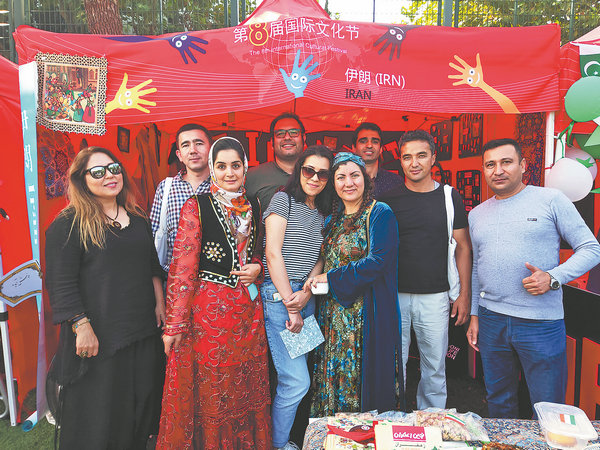

In addition to the companies helping to build infrastructure in the countries involved in the Belt and Road Initiative, academic institutions are also contributing as key participants, helping forge mutual understanding between people in China and other BRI nations, through research, educational projects and cultural exchange.
Donghua University in Shanghai is a prime example. Last year, 1,614 international students from 87 countries and regions involved in the BRI were enrolled at the university, 79.4 percent of the foreign student population on its campus.
Rimma Zakirova from Uzbekistan says she decided to study at Donghua University after learning of its vibrant international environment and campus culture.
The Uzbek, who is currently a business administration undergraduate, says that her interest in the field was sparked by her parents, who used to tell her about the rise of China's economy.
"I am eager to introduce what I have learned to the people in my country, and help it to develop in the future," Zakirova says, adding that the approaches China uses to modernize its economic structure would be of great value to Uzbekistan.
Students like Zakirova from other nations involved in the BRI have played a part in connecting China to their home countries.
Nikola Zivlak, a Donghua alumnus from Serbia, helped arrange for the University of Novi Sad to host the 5th China-CEEC Higher Education Institutions Consortium in 2017 — CEEC standing for Central and Eastern European Country.
Zivlak was later appointed as deputy director of the BRI research institute in the University of Novi Sad to continue his work.
"The BRI was introduced the same year I graduated from Donghua University, and I've seen the great improvements it has brought to my country over the last 10 years. This is why I support the initiative," says Zivlak, who received his PhD in 2013.
"I'm excited to be able to contribute to the BRI through my own efforts."
Additionally, the faculty and students of Donghua University have been promoting Chinese culture to the countries involved in the initiative through Confucius Institutes. Over the last eight years, 31 students and staff members from Donghua University have volunteered at the Confucius Institute at Moi University in Kenya. Founded in 2015 with help from Donghua University, which is known for leading disciplines on textile, fashion, materials and trade, it is said to be the first of its kind among Confucius Institutes in Africa to specialize in textiles and clothing.
Huang Sui, an alumna of Donghua University, was a volunteer teacher at the institute in Kenya. She says that she was keen to share the beauty of Chinese culture and build friendships with African counterparts. She is now a postgraduate student at Fudan University, majoring in international Chinese language education.
In addition to volunteering at Confucius Institutes, faculty and students of Donghua university have also made efforts to boost academic collaboration with African institutions in recent years.
Donghua University has hosted an international symposium on textiles and apparel and an African cultural exchange forum for eight consecutive years, according to the university. It also hosted a photo exhibition featuring the fashion heritage of 12 regions along the Silk Road in 2017, and collaborated with a Kenyan institution to showcase contemporary Chinese fashion design in Africa in 2019.
In 2021, the book series, Textiles from Dunhuang, was published by the university after 15 years of research and collaboration with international experts.
The series emphasizes cultural exchange between China and other parts of the world while showcasing the splendor of Chinese silk.
Zheng Zheng contributed to this story.